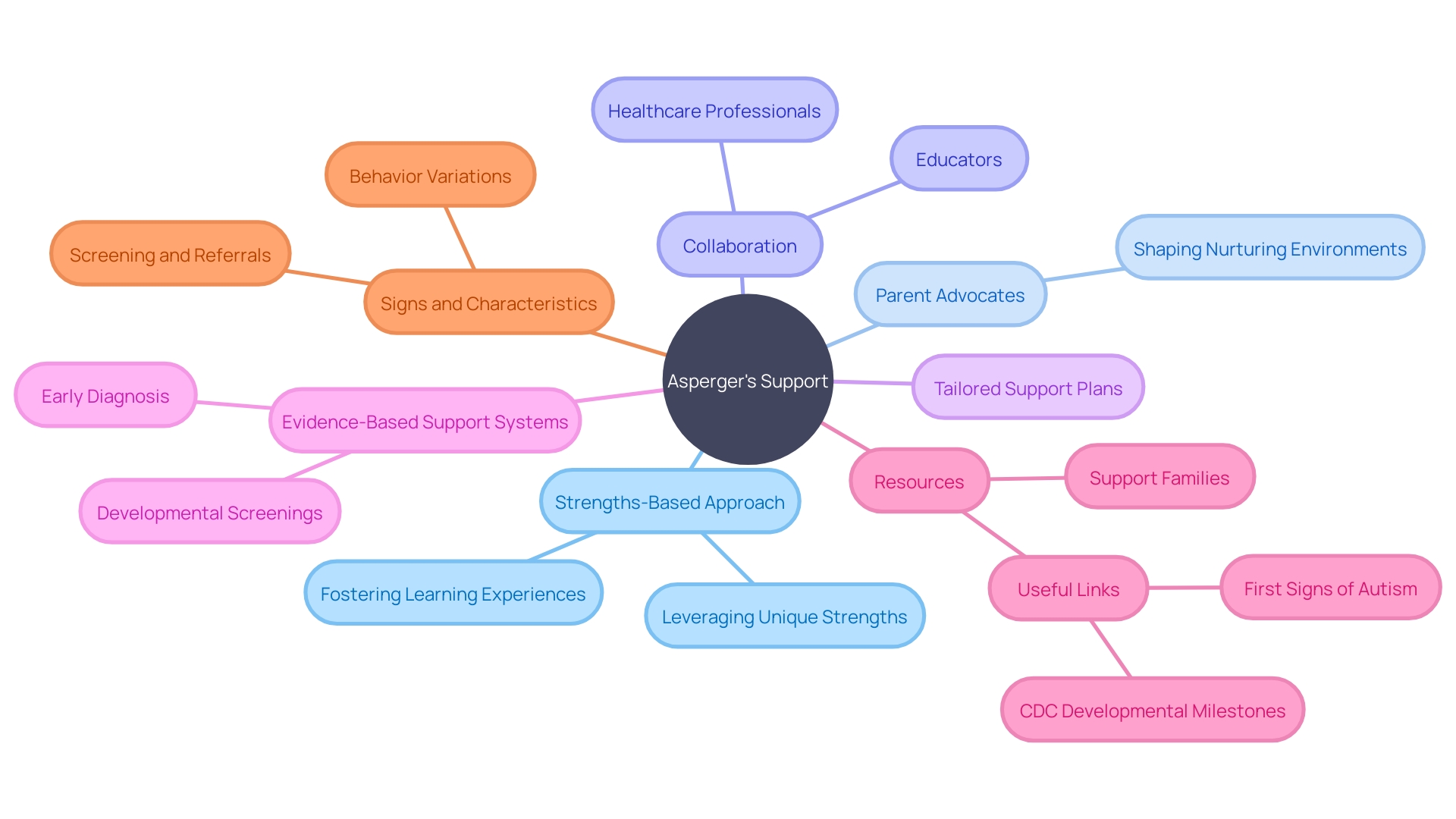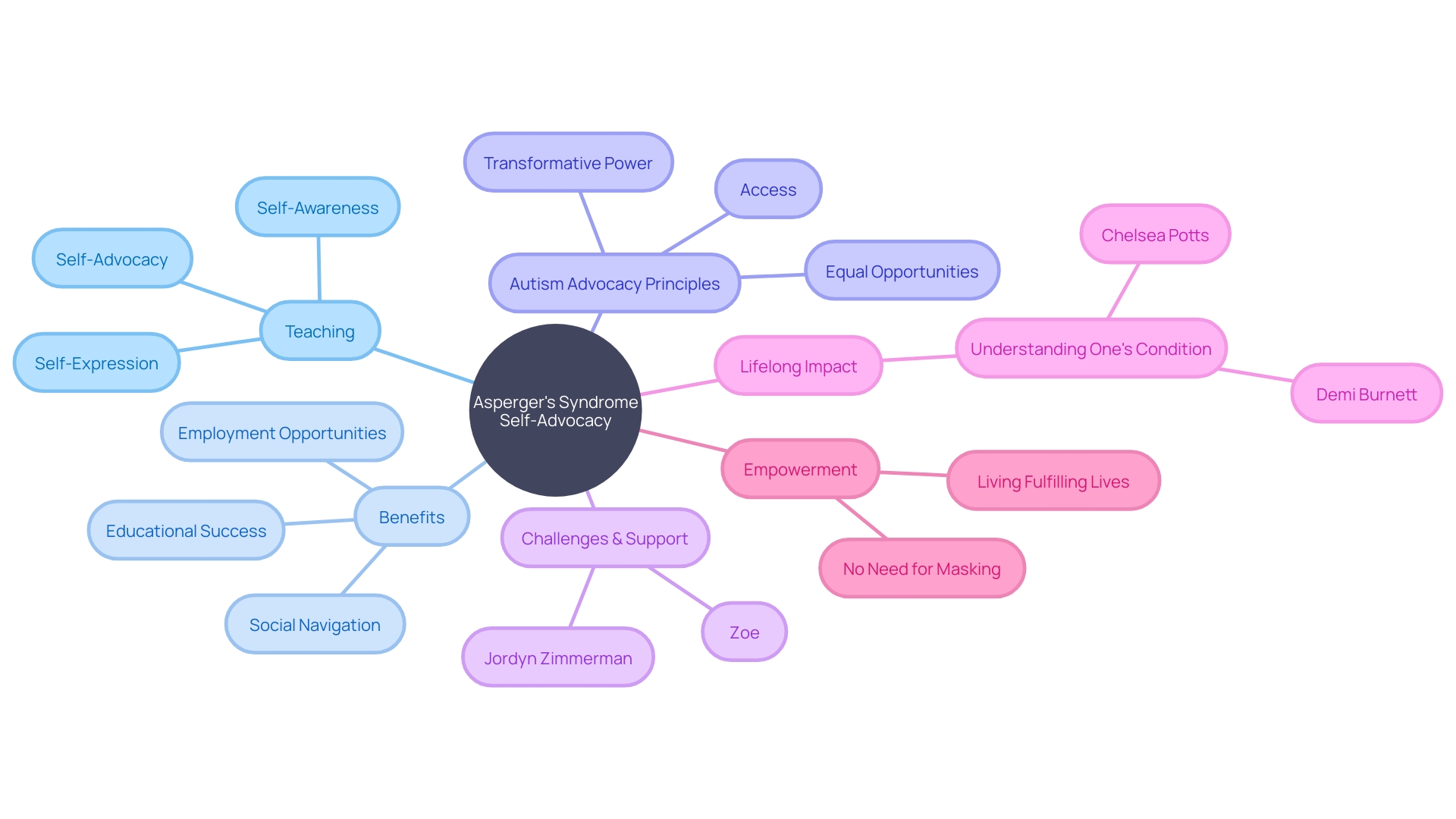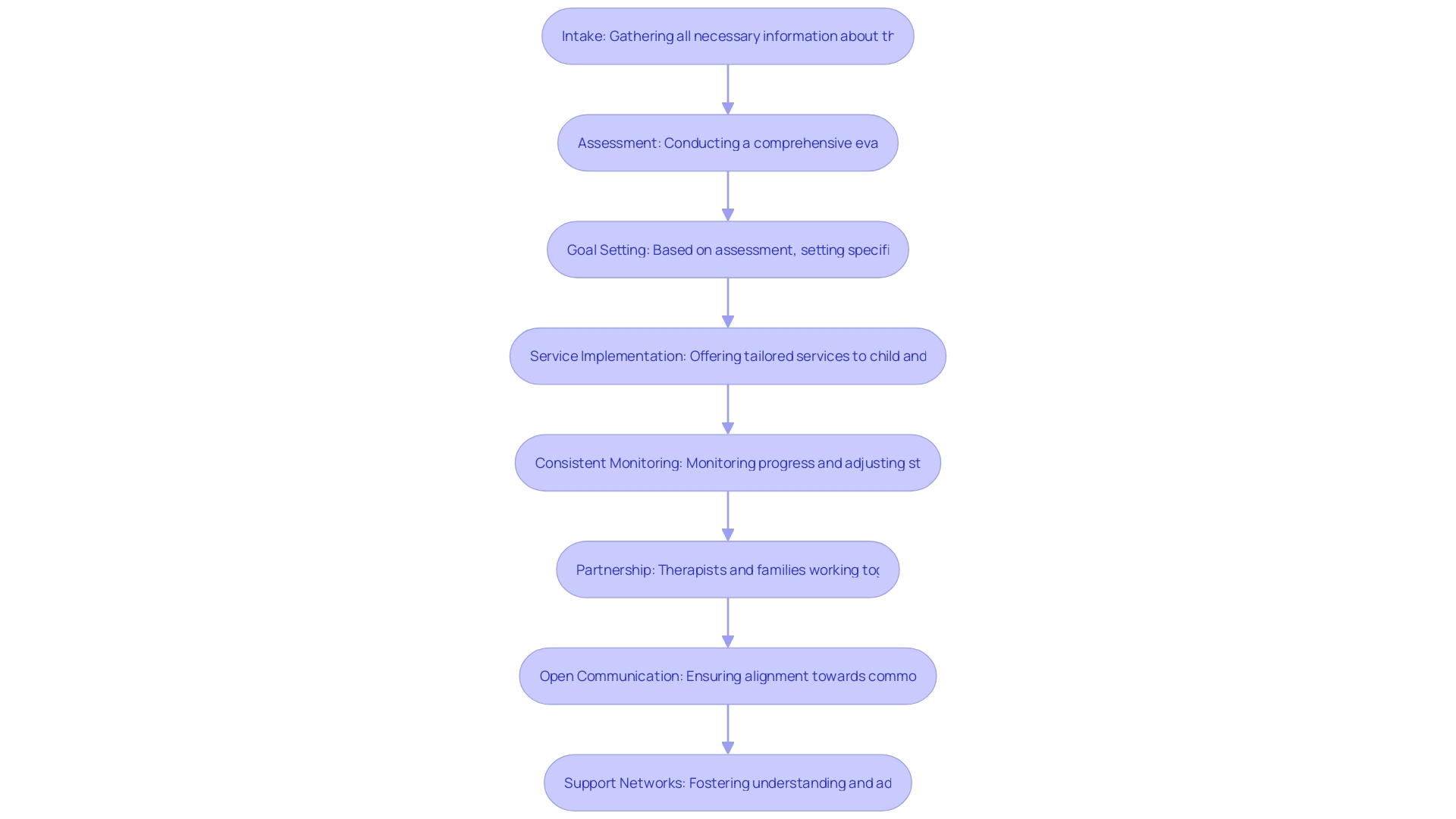Introduction
Navigating the complexities of Asperger's Syndrome, now recognized as Level 1 Autism Spectrum Disorder (ASD), requires a keen understanding of its manifestations. In this article, we will explore the challenges faced by individuals with Asperger's and the importance of support and advocacy from parent advocates.
We'll delve into recognizing the unique difficulties, developing effective strategies, promoting self-advocacy, and connecting with support networks. By empowering and supporting individuals with Asperger's, we can ensure their well-being and foster a more inclusive society.
Understanding Asperger's Syndrome
Navigating the complexities of autism spectrum disorder (ASD) requires a keen understanding of its manifestations, especially in the context of what was previously known as Asperger's Syndrome. Now recognized as Level 1 ASD, this condition is marked by significant challenges in social interaction and communication, alongside distinctive patterns of behavior and interests.
Despite these difficulties, individuals with this diagnosis often exhibit average to above-average intellectual capabilities, with many leading successful lives, as evidenced by public figures like Elon Musk. The prevalence of ASD, including conditions akin to the former Asperger's diagnosis, is uniform across racial, ethnic, and socioeconomic groups.
Yet, it is more commonly diagnosed in males, with a notable rise in identifications among both children and adults in recent years. In fact, research reveals that 44% of those diagnosed with ASD fall within the average to above-average intelligence range, debunking the misconception that autism is synonymous with intellectual disability.
The term "Asperger's Syndrome" has been retired from professional use, and the community is encouraged to adopt non-eponymous terms that reflect a more inclusive and accurate understanding of the condition. This shift not only recognizes the collaborative efforts behind medical discoveries but also distances the terminology from the ethical controversies associated with historical figures. Understanding ASD's broad spectrum is crucial, as it encompasses a range of symptoms from difficulty in forming relationships to sensory sensitivities. The term "spectrum" was introduced to acknowledge the diversity of experiences among individuals with ASD. As we embrace this nuanced perspective, we empower those affected to define their identity in a way that feels most authentic to them, whether they align with the historical label of Asperger's or prefer to identify simply as autistic.
Recognizing the Challenges
As parents and advocates, understanding the nuances of Asperger's Syndrome is crucial in supporting individuals through their unique challenges. Those with Asperger's may struggle with social cues and exhibit a preference for structured routines.
Sensory sensitivities are also common, and these can manifest in various ways, from discomfort with certain textures to being overwhelmed by loud noises. Recognizing these challenges is the first step in fostering an environment where individuals with Asperger's can thrive.
Recent studies underscore the complexity of autism spectrum disorders (ASD), including Asperger's, revealing that genetics and environmental factors such as insecticide exposure and childhood infections may play significant roles. Links have also been found between ASD and the gut biome, highlighting the multifaceted nature of these conditions.
Interestingly, research from Ontario, Canada, involving over 1.3 million children, suggests a slight increase in ASD diagnoses among children born to individuals with infertility challenges, although fertility treatments themselves were not a contributing factor. The psychological and societal hurdles do not end in childhood.
Adults with Asperger's often face misdiagnosis or are overlooked by healthcare practitioners unfamiliar with the condition. Many report being turned away and referred to specialists with long waiting lists, resulting in a lack of access to necessary care.
As Vanessa Bal, PhD, from Rutgers University, emphasizes, the key is to treat the individual's specific needs rather than defaulting to an autism diagnosis as a reason to exclude them from care. It's also important to note the strengths that many with Asperger's possess, such as attention to detail and deep focus on areas of interest. By establishing trust and understanding, we can collaborate more effectively with individuals with Asperger's. The prevalence of ASD in adults is significant, with 1 in 45 diagnosed in the U.S. alone, pointing to the importance of awareness and support for this community. The challenges they face, including the potential for intellectual disability, only heighten as they age, with boys being diagnosed more frequently than girls. In conclusion, addressing the unique challenges of Asperger's Syndrome with informed, compassionate support can make a meaningful difference in the lives of those affected.
Developing Effective Strategies
In the journey of supporting individuals with Asperger's Syndrome, parent advocates are instrumental in shaping a nurturing environment that leverages each child's unique strengths. Rather than attempting to 'fix' or change these individuals to fit a perceived norm, the focus should be on embracing their distinctive capabilities.
For instance, many on the autism spectrum exhibit remarkable memory, visual thinking prowess, and an admirable penchant for honesty. By acknowledging and fostering these traits, we can optimize learning experiences and potentially open doors to professional opportunities that align with their specialized interests.
A strengths-based approach, as theorized by social worker Bertha Reynolds, encourages us to look beyond the deficits and instead highlight the diverse talents within the autistic community. This shift in perspective is not just a theoretical exercise but a practical way to remove stigma and support mental health.
Dr. Deborah Bilder emphasizes the importance of a conscientious approach to mental health in autism, noting the high rates of psychiatric concerns among this population. It's essential for parent advocates to work collaboratively with educators and healthcare professionals to formulate support plans that are not one-size-fits-all but tailored to the individual. While there is a professional consensus on the importance of intensive, family-involved treatments that focus on generalization, empirical research comparing various intervention strategies is limited, particularly for children in the birth to 3 age group. This underscores the need for continued advocacy and the development of accessible, evidence-based support systems that recognize the full potential of children with autism.

Promoting Self-Advocacy
Teaching self-awareness, self-expression, and the ability to self-advocate is crucial for individuals with Asperger's Syndrome. These skills foster the confidence needed to navigate social, educational, and employment environments independently.
As noted by the Autistic Self Advocacy Network, the core of autism advocacy is the pursuit of a world where autistic people have equal opportunities and access. Embracing self-advocacy means embracing a future where personal voices are not just heard but are influential in shaping a shared community.
The story of Jordyn Zimmerman is a testament to this. Despite significant communication barriers, technology enabled her to express her true self, underscoring the transformative power of self-advocacy.
Sadly, not all stories have such positive outcomes. The tragic case of Zoe, who faced misunderstanding and misdiagnosis in the mental health system, highlights the dire consequences of a lack of support and the critical need for informed self-advocacy. The increasing number of adults receiving late autism diagnosis, like 'The Bachelor' star Demi Burnett and Chelsea Potts, further illustrates the lifelong impact of understanding one's own condition. These narratives reinforce the importance of empowering those with Asperger's Syndrome to advocate for their own needs, ensuring they can lead fulfilling lives without having to 'mask' their true identities.

Connecting with Support Networks
For parents of children with Asperger's Syndrome, the journey is often paved with unique challenges that require a tailored approach to support and advocacy. Such an approach begins with a thorough intake and assessment, allowing for a detailed understanding of the child's needs and the creation of a personalized plan.
This plan is brought to life through service implementation, where a range of services is provided, tailored specifically to the child and family's needs. The partnership between therapists and families is crucial, with open communication ensuring that everyone is aligned towards common goals.
Families who have walked this path and seen positive changes offer encouragement and a testament to the power of support networks. As one caregiver expressed, understanding a child's needs, including the intricacies of their medications and behaviors, is a critical responsibility.
They advise caution when considering information and treatments found online, emphasizing the importance of consulting with experts and recognizing when to take a break from relentless research. The importance of such networks is underscored by the National Alliance on Mental Illness (NAMI), which emphasizes the value of community in fostering understanding and advocacy.
The NAMI National Convention is an example of a platform where advocates can share their experiences and learn about the latest research. This gathering of minds and hearts can be a source of strength and knowledge for those dedicated to improving the lives of individuals with Asperger's Syndrome. Research indicates that social support and peer connections are not just beneficial but essential. They contribute to family well-being, strengthen family functioning, and provide hope and optimism for the future. In a world that may not always accommodate the needs of individuals with Asperger's Syndrome, the support from these networks can be a lifeline, helping to navigate and mitigate the stressors that can lead to conditions such as anxiety, depression, and even autistic burnout. As we consider the diverse experiences of families, it's clear that support networks can indeed serve as a powerful tool for advocacy, connection, and empowerment.

Conclusion
In conclusion, understanding and supporting individuals with Asperger's Syndrome requires recognizing their unique challenges and developing effective strategies. Parent advocates play a crucial role in shaping nurturing environments that leverage their strengths.
By recognizing sensory sensitivities, social cues difficulties, and a preference for structured routines, we can create an environment where individuals with Asperger's can thrive. Embracing their distinctive capabilities and fostering a strengths-based approach optimizes learning experiences and opens doors to professional opportunities aligned with their specialized interests.
Teaching self-awareness, self-expression, and self-advocacy is crucial for individuals with Asperger's. Empowering them to advocate for their own needs ensures they can lead fulfilling lives without masking their true identities.
Connecting with support networks is essential for parents of children with Asperger's. Tailored support plans implemented through personalized services provide strength and knowledge for improving the lives of individuals with Asperger's Syndrome. By addressing these challenges through informed, compassionate support from parent advocates and connecting with support networks, we can make a meaningful difference in the lives of those affected. Together, we can foster a more inclusive society that embraces diversity and empowers individuals on the autism spectrum.




